#3) ATLA is all about Aang making bad and difficult decisions
Explore tagged Tumblr posts
Note
Have/do you watch atla? If so, who's your favorite character?
I love ATLA. Katara remains a strong favorite but after rewatching it in March, i think Aang is almost tied with her.
#ask quill#I think the reason why Aang is so under appreciated is because#1) the entire main cast is fantastic. it’s so hard to pick a favorite#2) petty ship wars#3) ATLA is all about Aang making bad and difficult decisions#so when the last thing he does is be given an easy solution because he refuses to deal with a hard one.#it hurts the perception of his character
128 notes
·
View notes
Text
just saw quite the heated discussion on communist twitter about the “damage” dealt by atla and its pacifist teachings and its inspired some thoughts from me.
i think it is a valid critic that because atla was written by american white dudes during the bush administration, you probably aren’t going to derive the most revolutionary mores from the show. that’s understandable, and i can understand some viewers’ frustration with aang not killing ozai at the end because of the “violence is always bad!!!” message that the show really hammers home. but i think the original idea that atla is counter-revolutionary because of this lacks some nuance.
for starters, even given the incredible amounts of bias that comes with the show’s writers and writing, atla is still a pretty revolutionary show. especially because it is, at the end of the day, a kids’ show. i’ve written extensively about how atla teaches its audience about anti-imperialism through the lens of critical pedagogy, but i’ll spare you from listening to my whole spiel about it. in essence, it is still widely impressive that a show like that was able to deliver such a message through a kids show on a kids network in a country that was actively engaged in a pointless, imperialist war. as for it not being “revolutionary enough” by failing to more thoroughly teach redistributive justice and presenting nonviolence as something that is “holier than thou”, i have a few qualms.
1. aang is a pacifist monk. obviously its worth knowing that the tibetan monks that inspired some of the air nomads did hold slaves until the communist revolution, but the air nomads are indeed fictional and thus wholly pacifistic. all he has ever known is pacifism and nonviolence. moreover, aang is the only remaining part of a genocided community. the philosophy of the air nomads is literally one of the only things aang has left from his culture and community, so naturally it is extremely important to him.
2. this one i cannot emphasize enough: aang is a literal child. he is 12. asking a child to kill someone, even if that someone is a genocidal warmongering imperialist, is a difficult thing to ask. aang never wanted to be a part of the whole war to begin with, understandably so, because he was just a kid; kids shouldn’t have to make these kinds of decisions. as older members of atla’s audience, it can be easy to put ourselves in aang’s position and be at peace with that kind of decision because 1) this world isn’t real, so our perception of a character’s decision does not materially affect us at all and 2) we, the older audience, are not children. maybe this is a hot take, but it isn’t that unrealistic for a child to be freaked out by the thought of killing someone, especially if killing is against what that child considers to be important. hell, i’m an adult and i am freaked out by the prospect of having to take life. i don’t think i could do it either.
3. violence as retribution is dangerous. a very smart observation from a different user in the discussion was that violence is a necessary tool of the proletariat because the bourgeoisie will not give us liberation willingly, but this is because violence is serving a means to an end. without this, violence as retribution is a difficult cycle to end. it very much reminds me of the last of us part 2, and how revenge is not always fulfilling and more often than not leads to more death and destruction. the desire for retribution is valid and justified, but acting on it just makes things worse.
4. we have to remember that this is a kids show. the show is already pretty subversive in including topics on imperialism, colonialism, forgiveness, etc., with most of the deeper revolutionary stuff being noticed by older viewers. these topics are already difficult to understand, so it has to be dumbed down and simplified a bit for the audience of 6 to 12 year olds. there’s a reason why atla is a kids show and not an adult animation or even specifically a y/a animation, and that’s because the intended audience is children. i think its a bit ridiculous to expect a kids show to have a scholarly level discussion of anti-imperialism. while i think teaching these kinds of things to children is super important, as enjoyers of art/intellectuals/anti-capitalists, i think it is also important that kids shows are fun to watch. atla is fun to watch for a whole host of reasons.
sorry for the length of the rant, but my passion for atla even after my hyperfixation on it has dulled is something that makes me think a lot. while i do consider myself an intellectual and anti-capitalist, sometimes i think we take things way too seriously. shows like atla, even with all of its flaws and deeper meanings, are allowed to be fun. storytelling doesn’t have to be perfect nor does it have to have perfect intentions for it to be important. people deserve to have a respite from intense intellectual thinking sometimes. anyways happy monday!
#atla#Avatar The Last Airbender#lok#TLOK#the legend of korra#aang#ozai#communism#anti-imperialism#am i bored and writing this because i'm going through a breakup? yeah. do i care? no.
45 notes
·
View notes
Note
You said in your finnrey/zutara post that studio meddling was involved for both. I knew that this was the case for finnrey because of racist cowards. But I never knew that was the case for zutara? Tbh I just assumed from the get-go that aang and katara were the main ship and I thought it was cute for them to end up together in the end. Though it is really interesting to learn that zuko and katara could’ve also been a serious thing and I think they could also work together rather nicely. What happened behind the scenes that caused it not to happen? Was aang originally gonna be set up with toph or have no love interest?
Oh hello! Hi! My first anon. Welcome :)
Before we start: I’m going to write Kat/aang, A/ang and Bry/ke like that so it doesn’t appear in the tags and I’ll bold some sections for emphasis.
I don’t think the writers even considered Toph as a love interest for A/ang. It was always about Kat/aang vs Zutara.
It’s no secret at this point that Dante Basco and Mae Whitman, who voiced Zuko and Katara respectively, ship Zutara. Dante Basco is known as the “captain of the Zutara ship”. They’ve written multiple times about Zutara on Twitter and Dante Basco said in an interview that he really thought, at one point, that Zuko and Katara were going to end up together, that he thought it was going that way, and that he loved the idea of fire and water together.
As for the writers, it’s a bit more difficult to find information, since the show ended 15 years ago. But Aaron Ehasz, head writer of ATLA, has come out and said there was supposed to be a fourth season and it was dropped in favor of the movie. He said it on Twitter on April 1rst, 2019 (while also saying sorry for picking that date, it wasn���t an April Fools!). He said that M Night Shyamalan wanted them to focus on Book 4, but Bry/ke (Bryan Konietsko and Mike DiMartino) “wanted to focus on the movie”. You can find those tweets here. Not about Zutara per se, but it does show not everyone was on board with how the show was going to end behind the scenes.
Speaking of the movie, when asked about The Last Airbender, M Night Shyamalan also gave his input on the situation. He talked about how, by the time Book 3 came around, he wasn’t sure if the series was supposed to end there or if there was going to be a Book 4. He said to Bry/ke: ““Dudes, I gotta know this. This is critical! This has to end. This has to end. If it doesn’t end, I’m not on board. But if you don’t want to end it - it’s all good.” They were like “no, we saw it as three seasons for each element that he has to learn.” And I said “great.”” This is where it gets interesting, though: “At that time they hadn’t even decided where things were going to end, even like who Katara was going to end up with. All of that stuff hadn’t been figured out yet.”
It’s interesting to me how he mentions this is who Katara will end up with. Not A/ang, not Zuko. It’s always about Katara.
Someone who interned on ATLA has been quoted as saying that “If you check out the I.P. Bible then you’ll see a Kat/aang endgame was never planned from the start, it was supposed to remain a one-sided crush throughout the whole show.“ and that “The actual decision to make them a couple came about much later at Bry/ke’s request, largely because they were frustrated at the popularity of Zutara.“ Of course, not everyone in the production was full on one side or the other, as the post says some were neutral about it. “Some of the crew liked Kat/aang, I know Joaquim [Dos Santos] was a big Kat/aang supporter but more of them were neutral about it, Ehasz was not fond of Kat/aang but he didn’t mind too much since he’s a mature adult and all that.”
Avatar Extras (special events on Nicktoons where episodes of ATLA were shown with fun facts) were released where it was said that Zuko was supposed to be Katara’s love interest. It was said two times at least. I’ve only ever found screencaps of these, but I found these here on Tumblr.
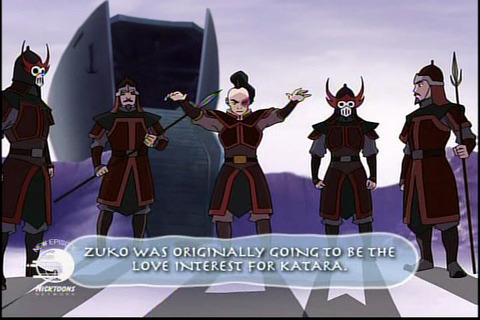

When asked about these in the Avatar Extras, Bry/ke said that it was just a joke and that Kat/aang was always in the DNA of the show. But if you’re here to tell fun facts to your audience about your show, maybe put a disclaimer that says some things might not be as truthful as they think they will be?
And the intern mentioned earlier also said that “No one was having full-on ship wars in the writer’s room but we did joke about it, and we toyed with the idea of Zuko and Katara falling in love a couple of times.“ So that goes well with the Avatar Extras.
Meanwhile, other writers, like John O’Bryan, have been quoted talking against Zutara in favor of Kat/aang. EDIT: Thank you to @exhaustedhope for giving me a source for this quote! This link also has a few images for the quote, so I’ll add them here.
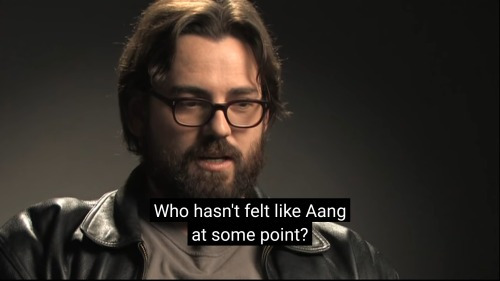

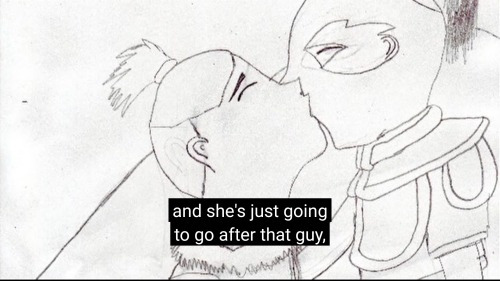

Thank you again! And also the use of Zutara fanart to badmouth the ship in favor of Kat/aang? Dude.
If this was the way people behind the scenes were thinking of Katara and A/ang’s and Katara and Zuko’s relationships... well that doesn’t really make me think “Kat/aang was in the DNA of the show” either, huh? Zuko was never officially her love interest, Katara never actually “went after that guy”. But the thought that she might made them uneasy.
(Btw, let’s not forget Zuko actually does care about Katara, enough to put his life on the line for her in Book 3, so that mischaracterizes Zuko.)
This comment by John O’Bryan fits with this vision of Zutara Bry/ke has, where Zuko is nothing but a broody, emo “bad boy” who doesn’t care about Katara at all. It’s shown pretty well in their dreadful “joke” made at Comic Con in 2007. You can find the video here. Here, Katara ends up with A/ang and “should have never doubted the will of Mike and Bryan!” (yuck). So Kat/aang was always the “right” way for them to end the show, right?
But then! Even Bry/ke themselves have said that Kat/aang was forced. They said it in 2014 when Korrasami became canon in Legend of Korra. On Korrasami and Kat/aang, they said this: “Originally, [Korrasami] was primarily intended to be a strong friendship. Frankly, we wanted to set most of the romance business aside for the last two seasons. Personally, at that point I didn’t want Korra to have to end up with someone at the end of series. We obviously did it in Avatar, but even that felt a bit forced to me.“
So they admitted that Kat/aang was forced. They even mention the ATLA ship wars in the post. “Either direction we went [about Korrasami or Makorra], there would inevitably be a faction that was elated and another that was devastated. Trust me, I remember Kat/aang vs. Zutara. But one of those directions is going to be the one that feels right to us, and Mike and I have always made both Avatar and Korra for us, first and foremost.”
Okay. So what’s real about the behind the scenes of ATLA and what isn’t? Was Kat/aang in the DNA of the show, or did they go back and forth between Kat/aang and Zutara like they did with Korrasami and Makorra?
There have been conflicting informations scattered across the Internet over the years. Some people say one thing and others react, saying the opposite and that the first thing was false. Some people lied, or joked, to mess with the audience and toy with Zutara - or not, or maybe, or perhaps... What I think, though, is that not everything was set in stone. Some people were for Zutara and some people were for Kat/aang. And even after all of that, the big takeaway for me was: the end result that Bryke wanted so badly was lackluster in and of itself.
175 notes
·
View notes
Photo
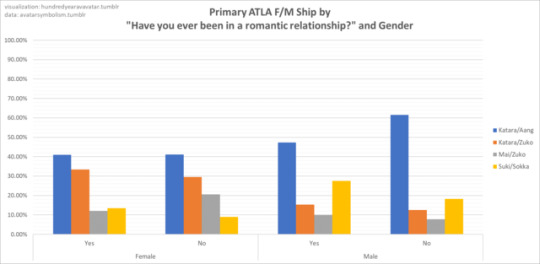
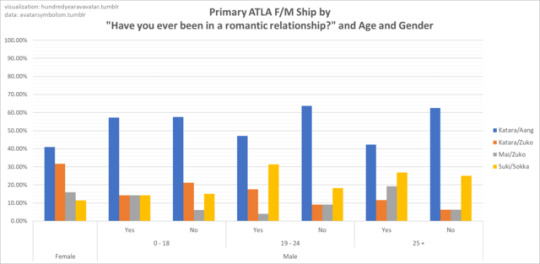
Is Kataang a Nice Guy ship? | Kataang vs Zutara
In a previous post, theadamantdaughter proposed that my understanding of Zutara could be applied to male preference for Kataang in relation to Nice Guys. I encourage you to read the previous post as this post will test and build on a lot of the ideas presented in that thread. In particular, my (perhaps misguided) definition of “self-insert” and then the rebranding as the word “relationality”.
I thought I wasn’t able to test their theory (whether proposed in earnest or not), but it turns out that I have data on romantic relationships. Let’s see if this can reveal anything to us.
Primary ATLA F/M Ship by “Have you ever been in a romantic relationship?” and Gender Notice that there might be an increase in Kataang preference in males who haven’t had romantic experience. It’s difficult to tell simply by looking if these two proportions are actually different or just the product of natural randomness. Normally, I’d say “we can’t know”, because there’s no pattern to compare it to. But, since the idea of Kataang being linked to Nice Guys was in my head, I noticed that the difference is larger than 10 percentage points. This is relatively large – perhaps large enough to be identified with a statistical test.
Using a contingency table (a type of statistical test), I’ve found that there is a significant difference between the two groups. If you’re familiar with the test, I found chi-square(df = 3, N = 195) = 4.00, p = .046. Good enough for me.
What this means is that we can be 95% confident that males who haven’t been in a romantic relationship actually do prefer Kataang more than males who have been in a romantic relationship. This statistical test makes no claim about why we see this difference, but merely that we are in fact seeing a difference. At this point, these results could be used to support a link between Nice Guys and Kataang. It’s prudent to do a bit more digging, so let’s take a look at another comparison.
Primary ATLA F/M Ship by Primary ATLA F/M Ship by “Have you ever been in a romantic relationship?” and Age and Gender A key observation in this chart is that the correlation of romantic experience to Kataang isn’t observed in males aged 18 and under.
We might understand this as indicating a relationship to Nice Guys. We can reason that “Nice Guys” (definition which is yet to be clarified) are going to be these males who haven’t been in a romantic relationship after becoming 19. We could then argue that <18 males who haven’t been in a relationship have no reason to adopt a Nice Guy viewpoint, which is why there isn’t a difference in Kataang preference. Hold this thought, as we’ll return to it later.
Speculation about why we see the pattern So now we have something that needs to be explained: that 19+ males who haven’t been in a romantic relationship tend to prefer Kataang more than those who have been in a relationship. We’ve approached the data with a hypothesis regarding Nice Guys, but it isn’t really a defined model. I think we have a general understanding of what it’s suggesting, but I want to get into the nitty gritty of what’s going on.
The basic idea is that if a male hasn’t been in a romantic relationship, then their views (particularly if they’re older) on romantic relationships are likely to be different to males who have. Of interest to us is the Nice Guy: a male who is frustrated because (as they see it) for some males it’s easy to enter into a relationship, while they themselves as “nice guys” haven’t been able to find a girl. Possible additions to this model of a Nice Guy include the view that females can be shallow, and that males can behave badly or disrespectfully in order to woo a female. While I think we can think that 19+ people (regardless of gender) who haven’t been in a romantic relationship could be frustrated with that situation, it’s not entirely clear to me that these additions of how they might view other people is necessarily a part of the Nice Guy. It’s hard to separate the meme from reality.
In the context of Kataang, Aang could be seen as a nice guy getting the girl in the end. Using my understanding of relationality that I explained in the previous post, these males are personally engaging with the relationship between Katara and Aang. This relationality could take multiple forms, from relating to Aang, to being attracted to Katara, to seeing value in the destined nature of their relationship.
In the previous post, I reasoned that we make our decisions first and then justify them later. We could use the current findings to challenge this theory, as we could argue that not having been in a relationship at 19+ is a draw towards Kataang. We could reason that <18 males don’t exhibit this Nice Guy effect because there is little expectation regarding relationships, so they aren’t Nice Guys.
But this chart suggests otherwise:
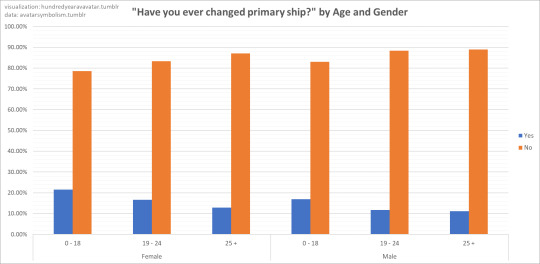
["Have you ever changed primary ship?" by "Have you ever been in a romantic relationship" and Age and Gender]
The majority of people don’t change their shipping preference. This supports my theory that we make our decisions early and then justify them later. A choice that a male made up to 9 years ago about a children’s TV show may be linked to whether or not they have been in a romantic relationship by today. That’s freaky. But having or not having been in a relationship isn’t causing people to choose Kataang – they’re just correlated. We want to find the reason that these two are linked.
I’m beginning to suspect that we are actually making a measure of personality. If the likelihood of entering into a romantic relationship is linked to certain personality traits, then perhaps this relationship/no-relationship comparison is actually a personality-type/personality-type comparison. For example, extrovert/introvert in a broad sense.
But, as you may have noticed, this puts us at odds with what we observed when we included Age. <18 males didn’t exhibit any difference. According to the reasoning I just put forward, <18 males should still exhibit these personality traits and so we should see an increased preference for Kataang in those who haven’t been in a relationship. Let’s look at this chart:
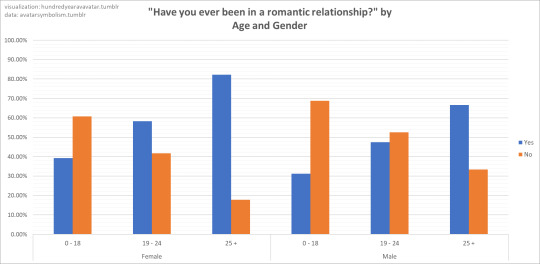
70% of <18 males haven’t been in a relationship, so I reason that we’re observing a dilution effect. If we took these <18 males and fast forwarded 9 years, my model predicts that we’d see the relationship/no-relationship pattern present in them too.
This is the model that I put forward. Males who haven’t been in a romantic relationship tend to prefer Kataang because of yet unidentified features of their personality. This type of personality tends to prefer Kataang, and also tends to result in no romantic partners. Personality is higher up in the causal network, and romantic experience and shipping preference are influenced by personality. In terms of the Nice Guy Hypothesis, I think it’s reasonable to suggest that males 19+ who haven’t been in a romantic relationship are more likely to be Nice Guys. So the answer to the question “is Kataang a Nice Guy ship?” is: these two things seem to be linked in some way.
theadamantdaughter’s proposal, if taken seriously and literally, can be understood as the idea that being a Nice Guy increases the likelihood that the male to “self-insert” (in the hard or soft sense of the word). Using the terminology of my previous post, this can be converted into the less dramatic proposition that Nice Guys have increased relationality with Kataang. However, there’s an important distinction between these two things being related, and these two things interacting. If we adopt my personality model, then it’s not immediately clear that the Nice Guy mentality was applied in the original preference for Kataang. If someone becomes a Nice Guy later in life, then how could a Nice Guy-related relationality be relevant to a decision made prior to becoming a Nice Guy? My model seems to suggest that this relationality isn’t important.
There are many other things I haven’t discussed. Alternative models that account for life choices or even single-sex schooling. A model which argues that the original Kataang choice might have been linked to a proto-Nice Guy mentality. Whether or not Zuko is seen as the “bad guy”. The potential support for my personality model through a link between romantic experience and female Maiko shipping. The trend with age and change in shipping preference. The possibility of linking Nice Guy to Kataang through also accounting for when people watched ATLA. These are interesting ideas, but this post is long enough already. All in all, hats off to theadamantdaughter. If it weren’t for their comments, I don’t think I would have noticed this extremely interesting pattern. Online interaction is a funny thing.
#Avatar The Last Airbender#survey#shipping#Kataang#Kataang vs Zutara#Have you ever been in a romantic relationship?#Have you ever changed primary ship?#Age#Gender#Primary ATLA F/M Ship
41 notes
·
View notes
Note
any fandom. 1, 10, 16.
1. What OTPs in your fandom(s) do you just not get?
In the GoT fandom, I honestly don’t get nor can I stand people who ship Sansa with Littlefinger. I’m also not fond of Sansa x Sandor either but I can sort of see it more. Sansa x LF though is just gross.
10. Most disliked arc? Why?
Aang in the ATLA fandom because listen, here’s the thing: Aang is a wonderful and amazing character from Book 1 all through to Book 2. But then you get to Book 3 and it goes to shit. He is essentially a displaced child in a century that’s not his own, he’s lost everything and everyone he ever knew, and so it makes sense he imprints on the first person who shows him compassion and kindness. That, of course, being Katara. Although she isn’t much older in age, she has always had to shoulder burdens far beyond her years so she slips easily into the mother figure role for a lot of them. It’s even canonically acknowledged in the show. And Katara mothers Aang more than anyone else. She constantly tries to shield him from the bad things in life, tries to console him when he throws childish tantrums, indulges him and takes care of him. I’m not saying he doesn’t deserve any of it but Katara is also a child herself no matter how mature she is and Aang never once offers the same comfort that she offers him. It’s entirely one-sided on that front.
And it was also canonically acknowledged in the show that Aang’s love for her is an anchor, holding his growth back, not allowing him to reach his Avatar state. He’s supposed to let her go. He’s supposed to learn, just as the other characters did, that war is about making difficult decisions and sacrifices. But in Book 3, Aang didn’t sacrifice anything. He didn’t have to because he got on a magical turtle and found out he could beat Ozai without having to kill him, without having to sacrifice his morals for the greater good or let Katara go at all. In the end, he got everything he wanted. He got a wife who catered to his every whim and mothered him, keeping him stagnant in his growth and development, and disillusioning him into thinking he can get away with anything as the Avatar. Again, this is even canonically acknowledged in the comics where Aang is shown to disregard Katara’s feelings for his own, making her feel underappreciated and then eventually his own children’s feelings by having a favourite he dotes on.
Basically, this is super long and I’m sorry but I’m still so angry about this. I loved Aang so much and they just fucked him up so badly.
16. If you could change anything in the show, what would you change?
Man oh man… If I could change anything on any show, I would go back to ATLA, give Aang the development he deserves, and make Zutara canon, like they deserve.
In the GoT fandom, I would get rid of Sansa’s Ramsay storyline and find a different way to bring her closer to Jon. Give her more time as Alayne Stone. I would rewrite the entirety of Season 7 that focused more on characters and sensical plots than dragon spectacle. I would do a lot of things differently. Far too much to write in one post anyhow xD
Thank you for sending these in!!
+ Salty Ask List +
#sansa stark#anti-bryke#avatar the last airbender#atla#game of thrones#ask me stuff#salty ask list#asks#freckldbellamy
25 notes
·
View notes
Text
Fullmetal Alchemist: Brotherhood and why Avatar hasn’t completely spoiled me.
Spoilers for both franchises!
Fullmetal Alchemist Brotherhood is what I was looking for from the Original Series. While still not quite at Avatar Level for a number of reasons It’s just a step below and I believe I will consider it one of my favorites and I definitely want to rewatch it someday! I will do some comparisons between both the Original Series and Avatar as my gold standard for storytelling.
The Music. This is something I will give the Original series, there were a number of really memorable tracks, such as Dante’s Theme that really helped give some atmosphere. Brotherhood on the other hand while having a serviceable soundtrack, doesn’t have anything very memorable or any tracks that really elevate a scene beyond its other qualities. Avatar is, of course, renowned for its music, Legend of Korra, in particular, had top-notch music that elevated many scenes emotionally into truly epic, sad and many other emotions.
The Humor. The humor is about on the same level as the original series, though even more exaggerated at many points. Though there are a number of more natural humor moments, like a guard snapping to attention with “I’m awake!” Other than a few moments like that the humor doesn’t work that well and it’s pretty much abandoned in the last third of the series, which makes sense given how serious things get but even Avatar managed to get good jokes in near the end. Hell one of the best jokes in ATLA is the war balloon “birthday party” in the penultimate episode. I think this may also be a dub issue, unless an anime is focused on comedy it can be very difficult for a dub to pick up on the comedic timing necessary to make the jokes work.
The Pacing. Although better than the original series, a lot of the plot of the last half of the series feels kind of like padding and could have been condensed into 2/3rds or even half the number of episodes and the series would have felt a lot tighter. The Final Arc especially drags on for way too long though it does pay off for the most part.
The Plot. This felt like a significant improvement over the original series. First, the scale felt a lot bigger and more epic and where the original could come off as convoluted, Brotherhood feels more like it’s complex. While there are plenty of twists and turns I never really had difficulty keeping everything straight up until towards the end and it wasn’t that bad and all the stuff going on helped give things an epic feel. However, like I said earlier it does feel like the plot is stretched out more than it needs to be, I wish it had been trimmed a bit to keep things going at a better pace.
The Characters. Again, a significant improvement over the original series as the side characters get a lot more development and more tend to have full arcs such as Scar and Greed. However, this is where I feel the show could have lived up to Avatar but didn’t quite make it. I think the key to being on that level, for me at least, is with the characters. As I said in my FMA review, ATLA and LOK were great in creating minor characters that had interesting personalities and designs such as Huu, Ryu, and the Nomads. But they don’t overstay their welcome, only appearing in an episode or two and often with a lot of space between appearances. Even the less interesting of these tend to have arcs that lend to character development for the main characters such as Haru to Katara, Teo to Aang and Tahno to Korra. Brotherhood while focusing more on character development than the original series it does tend to have too many side characters to get on the same level as Avatar’s characters. While LOK isn’t quite as strong in this regard it knows when to put certain characters in more minor roles when they aren’t relevant to the story or their arcs have finished. I think the definitive difference comes in several points. First, while I wouldn't call the characters in Brotherhood one note, as many have two or three levels to them, however what Avatar, particularly ATLA, did was make characters with many layers such as Zuko and Lin Beifong or even characters who were almost two people in one such as Katara where this fact isn’t even fully looked into until the last regular episode before the finale but is also a fact that can be seen from the very first episode. The other aspect I think that Avatar has is it’s cast and voice director that manages to give some of the best performances I’ve ever seen from comedy to drama, from John Michael Higgins legendary Varrick that manages to be both hilarious and occasionally intimidating and believable as both a Villain and Hero, to Mae Whitman as Katara who manages to have some of the most heart-wrenching scenes in the show almost purely through her performance from breaking down in tears over how hurt she feels because of her absent father to making the word “Me” one of the most powerful and emotional moments of the series. I will give Brotherhood this, while I wasn’t super invested in most of the characters, I did appreciate how in the end they managed to use some of the characters very well. In particular Greed’s sacrifice and Hohenheim's arc with his family, both of which were played well enough to get me teary eyed, even if I didn’t really care much about the characters themselves.
The Fights. While being better than the original series fight scenes, having a bit more creativity and energy, I do think Avatar has spoiled me forever so that only purely fight focused animes can live up to the level of Avatar as they are extremely well thought out with real martial arts and elemental abilities that make the fight scenes feel so intense. Additionally, I feel Avatar has a wonderful ability to incorporate emotion very well into the fights both in the lead-up and how the fights play out. From the beautiful and almost artistic fiery destruction that was the Last Agni Kai to what may be one of the best fight scenes of all time in the final battle between Korra and Kuvira that has such strong intensity and speed with constantly shifting tactics and moves. Additionally, the fight cinematography is fantastic, always showing us the battlefield and movements of the characters, rarely resorting to speed lines or distortion to make the action look faster and more intense, something Brotherhood was guilty of even in it’s most epic and near end fight scenes such as Scar vs. Wrath.
The Villains. This was one of the biggest improvements from the original series in my opinion. While most of the villains are still pretty one note, they are handled much better. First, they don’t have the bizarre desire to become human despite how the reasons were only explained, poorly, in a single line. Two, contrary to the original series, the villains loathe human beings and revel in their own inhumanity, but for some at least it is a cover for their envy of humanity and while it’s the same idea as the original series it is done in a much more compelling way. In particular what they do with Greed is fascinating, showing how Greed as a concept is really just seeking empty things that a person believes will make them feel whole but that ultimately what they are “greedy” for is the love of other people, showing how it isn’t just an evil. This was hinted at in the original series, but Brotherhood makes it a complete Arc. And while I found Homunculus himself to be boring most of the time, I did really like his final moments which made me wish we had seen a deeper exploration of this aspect of his character.
Winry. She is done a lot better in Brotherhood, making her more 3 dimensional. When she makes a mistake she feels guilt and will actually apologize and try to change, and her issues with her parents’ death are fully explored and resolved. Finally, while her relationship with Ed doesn’t get an Avatar super romantic ending, it does feel way more resolved than in the Original series as in this they at least admit their feelings.
Izumi. This is probably the best improvement from the original series. While she isn’t an amazing character in Brotherhood, she was so insufferable in the original and was around far too long. While she is still a bit of a wacko, the hateful aspects of her character are toned down to almost zero. While she still has the brothers live on an island for a month, she doesn’t have some dude beat the crap out of them and the show does actually question if this is the right thing to do and implies that Izumi may have a skewed perspective. And she is able to have a legitimate emotional moment with the brothers without resorting to violence and recognizes her mistake in not telling them about messing up herself. Again while she is not an amazing character in Brotherhood, she was so bad in the original that it almost ruined the show for me.
The Ending. Again, while I feel the final arc lasted way too long the payoff was mostly worth it. While there were some plot details that were a bit confusing and some metaphysical stuff that made me raise an eyebrow (Avatar was great in establishing its metaphysical aspects in preparation for the finales). However I feel that most of if not all the important characters have satisfying resolutions to their stories, with Hohenheim finally wanting to live in his dying moments, Roy realizing he has to ascend to power while doing good instead of waiting until he’s there, Scar learning to look beyond his hate to do what’s best for his people, and probably the best with Ed. While Ed was a good character, I never really loved him, but I will give him credit for having one of the best resolutions to an arc I’ve seen, deciding to give up his power in order to save his brother. And I love how the seemingly indifferent/malevolent Truth was actually pleased in the end to see Ed make the right decision, that despite his harshness and some mean-spiritedness, Truth ultimately wants Humanity to learn and change for the better and will punish anyone both well and ill-intentioned who has the hubris to play god.
Ultimately, while I can’t put Brotherhood in the same ranks as Avatar, I do place it as one of my favorite shows I’ve watched and look forward to rewatching it someday and would like to share it with a friend who may enjoy it. But here is where I can define a tangible difference, I can show Avatar to anyone, I watched it with my rather intellectual father and he loved both series and even liked some of the humor quite well. I don’t feel him or certain other people would appreciate Brotherhood on that same level even though I am pretty close myself.
#fullmetal alchemist#fullmetal alchemsit brotherhood#edward elric#alphonse elric#avatar#Avatar The Last Airbender#legend of korra#korra#katara#varrick#van hohenheim#greed the avaricious#roy mustang#winry rockbell#izumi curtis
3 notes
·
View notes